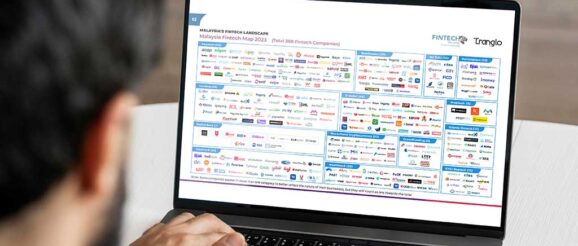Malaysia Fintech Report 2023: Landmark Year in Financial Innovation

The past 12 months have been a pivotal period for financial innovation in the country, featuring milestone moments and historic regulatory developments that are transforming the local fintech landscape. The 2023 Malaysia Fintech Report outlines many of these game-changing moments, giving an overview of where the industry is headed.
The 2023 Malaysia Fintech Report is produced by Fintech News Malaysia and supported by Tranglo, CapBay, Curlex, Paywatch, PolicyStreet, and PitchIn.The 2023 edition highlights some remarkable happenings within both the evolving financial services industry as well as the bleeding edge of where authorities like the central Bank Negara Malaysia (BNM) and the Securities Commission Malaysia (SC) are defining new parameters for various fintech subsectors.
Recent years have witnessed impressive strides, including the introduction of the Real-Time Retail Payments Platform (RPP) that provided the foundation for QR code-based instant payments, cross-border payment linkages with neighbouring ASEAN countries, and embedded, interoperable capabilities between merchants, fintechs, and banks.
Malaysia continued to be ranked first on the Global Islamic Fintech (GIFT) Index, which measures the conduciveness of a country’s environment for the growth of Islamic fintech. The Consumer Credit Act enacted in 2022 is setting the foundation for the Consumer Credit Oversight Board (CCOB) to regulate non-bank credit entities like moneylenders, pawnbrokers, and ‘buy now pay later’ (BNPL) operators, with the intention of ensure responsible lending practices in the country.
And that’s not all. Here are three key takeaways from the 2023 Malaysia Fintech Report.
Digital Insurance Licensing Framework in Sight
In November 2022, BNM issued its exposure draft for digital insurance and takaful operators (DITOs), laying the groundwork for digital insurance licenses to be issued eventually. The draft proposes a framework to support the introduction of DITOs in Malaysia, with the eligibility criteria aiming for policy outcomes of inclusion, competition, and efficiency.
On the day the 2023 Malaysia Fintech Report was revealed at the Fintech Frontiers Conference, BNM ended its consultation on the exposure draft after receiving feedback from over 50 stakeholders.
The central bank intends to refine the DITO draft framework, clarifying provisions for innovative models like embedded insurance and insurance-as-a-service. BNM aims to finalise its policy document and call for applications for up to five DITO licenses in 2024.
Applications would be evaluated based on various criteria, such as innovation, financial inclusion, consumer protection, and financial soundness. During this period, they would be subject to simplified requirements such as a lower minimum number of Shariah committee members and a lower minimum paid-up capital.
Digital Banks Get Ready to Go Live
Online and mobile banking continued to see positive growth in 2022 and 2023, with electronic transactions using connected mobile devices and DuitNow QR codes becoming increasingly commonplace. In 2022, e-payment transactions grew by 31.5% to 9.5 billion from 7.2 billion in 2021.
But while incumbent banks saw growing momentum via digital channels, branchless digital-only banks were not to be outdone. Traditional banks still manage branches and possess legacy systems that may not be best suited for the heavy influx of digital-first operations that they deal with today.
To better handle this modernisation of financial services and promote financial inclusion efforts, five consortiums were granted full digital banking licenses in April 2022. Since then, the groups have been carrying out operational readiness checks, such as appointing management and Board members, instituting key policies and control procedures, and finalising their digital infrastructure.
Last month, GXBank became the first digital bank to receive BNM approval to begin operations, well ahead of the April 2024 deadline set by the central bank. The bank will begin beta-testing its app, starting with its employees from GXBank and its investors, Grab and Kuok Group, and then will progressively roll out its services to a wider pool of users.
ECF, P2P Financing Overtakes Venture Capital in Malaysia
The Malaysia Co-Investment Fund (MyCIF) reported that a total of RM638 million have been co-invested in almost 35,000 equity crowdfunding (ECF) and peer-to-peer (P2P) financing campaigns in 2022, benefitting some 3,635 Malaysian MSMEs.
In total, alternative financing like ECF and P2P grew by 23.6% from the previous year. Since being introduced in 2018, ECF/P2P fundraising has grown by a massive 97.6% per annum, highlighting the popularity of alternative financing in Malaysia.
The growth has been so pronounced that ECF and P2P platforms have collectively raised more than venture capital (VC) funding. As per the SC of Malaysia, ECF and P2P platforms raised over US$1.6 billion in funding in 2022, representing a 26% year-on-year increase. These figures indicate a shift in financing trends in Malaysia, wherein the growing preference for alternative funding sources challenges traditional venture capital.
This is unusual as comparatively, the broader Southeast Asian region has yet to embrace alternative financing fully. For instance, in Thailand and Vietnam, regulatory frameworks for ECF and P2P platforms are still nascent.
2023 Malaysia Report Fintech Map
The Malaysian fintech ecosystem continues to thrive, with the 2023 edition of the Malaysia Fintech Map showcasing 308 fintech companies. That’s an increase from the 291 firms recorded in the 2022 map, despite the closure of a number of BNPL and digital lending outfits.
Payments continue to be the largest vertical with 69 firms, followed by lending and e-wallets with 44 entrants each. Remittance, insurtech (30 each), wealthtech (28). and blockchain/cryptocurrency (23) startups were also sizable categories.
New this year is the digital banking sub sector, comprising the five successful digital banking licensees and two spin-off digital banks, Rize powered by Al Rajhi and Be U by Bank Islam.
| Download the full Malaysia Fintech Report 2023 here |
The post Malaysia Fintech Report 2023: Landmark Year in Financial Innovation appeared first on Fintech News Malaysia.




